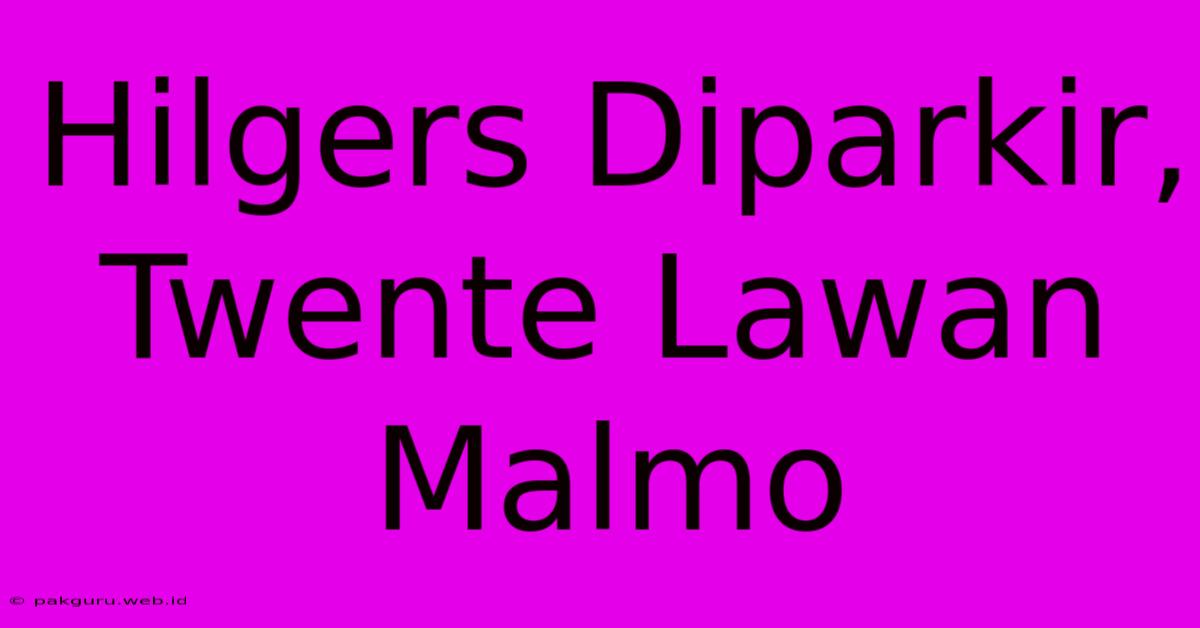Hilgers Diparkir, Twente Lawan Malmo

Discover more detailed and exciting information on our website. Click the link below to start your adventure: Visit Best Website wanagama.com. Don't miss out!
Table of Contents
Hilgers Diparkir, Twente Lawan Malmö: A Tactical Masterclass or a Costly Mistake?
FC Twente's recent clash against Malmö FF in the UEFA Europa Conference League threw up a fascinating tactical debate: the decision to bench the usually indispensable Mees Hilgers. This article delves into the implications of Hilgers' absence, analyzing the match's outcome and exploring the wider strategic considerations for Twente's manager.
The Hilgers Conundrum: Why Was He Benched?
Mees Hilgers is a pivotal figure in FC Twente's defensive structure. His strength, aerial prowess, and ability to launch attacks from the back make him a key component of their game plan. So, his absence from the starting XI against Malmö immediately raised eyebrows. Several potential explanations exist:
- Injury or Illness: A pre-match injury or illness, even a minor one, could have necessitated his omission. Official announcements from the club would clarify this.
- Tactical Shift: Perhaps the manager, Ron Jans, opted for a different tactical approach against Malmö. A more defensive strategy might have favored a different player profile alongside other defenders.
- Rotation Strategy: With a busy schedule, managing player workload is crucial. Resting a key player like Hilgers to maintain freshness for upcoming games could be a calculated risk.
- Disciplinary Reasons: While less likely to be publicly revealed, internal disciplinary issues could have played a role.
Analyzing Twente's Performance Without Hilgers
Twente's performance without Hilgers will be the subject of intense scrutiny. Did his absence directly impact the result? Several key aspects need to be considered:
- Defensive Solidity: Did the team's defensive stability suffer without Hilgers' physical presence and leadership at the back? Were they more vulnerable to set-pieces or through balls? Statistical analysis of tackles, clearances, and aerial duels won will shed light on this.
- Attacking Fluidity: Did the team's attacking build-up play change significantly? Hilgers' ability to carry the ball out of defense is a significant asset. His absence might have constrained Twente's offensive transitions.
- Overall Match Outcome: Ultimately, the match result will be the most telling factor. A victory would suggest the tactical change was successful, while a defeat might point towards Hilgers' importance being underestimated.
The Malmö Factor: How Did They Exploit Twente's Changes?
Malmö FF's tactics and their exploitation (or lack thereof) of Hilgers' absence should also be considered. Did they target the areas of the pitch where Twente appeared weakened? Analyzing their attacking patterns might reveal insights into Twente's vulnerabilities without Hilgers.
Long-Term Implications: The Bigger Picture
The decision to bench Hilgers has wider implications for FC Twente's season. It highlights the importance of squad depth and the manager's ability to adapt to different situations.
- Squad Depth Assessment: The performance of the replacement(s) for Hilgers will be crucial in assessing the overall strength of Twente's squad.
- Managerial Flexibility: Ron Jans' decision demonstrates his willingness to make bold tactical choices. The success or failure of this decision will shape future tactical approaches.
- Player Confidence: Hilgers' reaction to being benched will also be a factor to consider. Maintaining the morale and confidence of key players is vital for team success.
Conclusion: A Risk Worth Taking?
Ultimately, whether benching Hilgers against Malmö was a tactical masterclass or a costly mistake remains to be seen. A detailed post-match analysis, considering all aspects discussed above, will be necessary to reach a definitive conclusion. The debate, however, highlights the complex interplay of factors that contribute to success in elite football. The coming weeks will provide further insight into the long-term consequences of this significant decision.

Thank you for visiting our website wich cover about Hilgers Diparkir, Twente Lawan Malmo. We hope the information provided has been useful to you. Feel free to contact us if you have any questions or need further assistance. See you next time and dont miss to bookmark.
Featured Posts
-
Son Cetak Gol Tottenham Menang Dramatis
Jan 24, 2025
-
Nominasi Oscar 2025 Emilia Perez Bersinar
Jan 24, 2025
-
Arema Menang Gol Debut Tyronne Vs Persib
Jan 24, 2025
-
Amalan Rajab Lancarkan Rezeki Anda
Jan 24, 2025
-
Film Emilia Perez Dominasi Piala Oscar 2025
Jan 24, 2025
